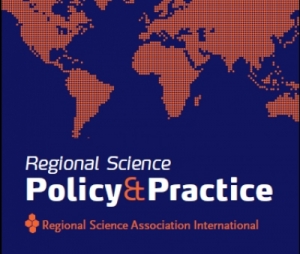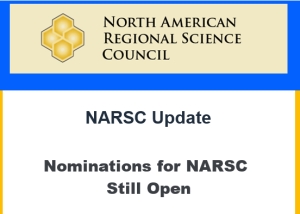RSAI Worldwide
Elisabete Martins
The latest issue of Papers in Regional Science is available! Volume 102, Issue 5, October 2023
|
|
Papers in Regional Science 901-1063
October 2023
|
ISSUE INFORMATION
FULL ARTICLES
Determinants of rural creative microclustering: Evidence from web-scraped data for England
Jorge A. Velez-Ospina, Josh Siepel, Inge Hill, Frances Rowe
Spatial mobility and overeducation of young workers: New evidence from France
Florian Fouquet, Florent Sari
From local to global, and return: Geographical indications and FDI in Europe
Riccardo Crescenzi, Fabrizio De Filippis, Mara Giua, Luca Salvatici, Cristina Vaquero-Piñeiro
Skills for smart specialisation: Relatedness, complexity and evaluation of priorities
Duygu Buyukyazici
Closed vs. open city models: A new empirical approach to an old question
Jeffrey A. DiBartolomeo, Geoffrey K. Turnbull
BOOK REVIEW
Roberto Dellisanti
Winner of 2023 RSAI Dissertation Award
 Dr Yunyu Tian is chosen as the winner of the RSAI dissertation award in 2023 for her PhD dissertation entitled “Earth Observation data for assessing global urbanization-sustainability nexuses”, which was successfully defended (with a cum laude distinction) on 6 June 2023 at Wageningen University and Research.
Dr Yunyu Tian is chosen as the winner of the RSAI dissertation award in 2023 for her PhD dissertation entitled “Earth Observation data for assessing global urbanization-sustainability nexuses”, which was successfully defended (with a cum laude distinction) on 6 June 2023 at Wageningen University and Research.
The cum laude distinction (only given to around 5% of all PhD students at Wageningen University) was awarded by an extended evaluation committee of nine persons. Dr Tian’s PhD dissertation made significant contributions towards the knowledge of urbanization and environmental changes at the global scale. The thesis included highly innovative methodological features such as the use of multi-source (and high quality) Earth Observation data and social data, contributing to academic and policy knowledge relating to global urbanization and sustainability as well as their nexus at the neighbourhood level. Part of the thesis has already been published in the form of academic peer-reviewed papers in the journals Landscape and Urban Planning (2022) and Environmental Research Letters (2022).
The RSAI congratulates Dr. Tian and her supervisors Professor Martin Herold and Professor Eveline van Leeuwen (Wageningen University).
Reminder | Call for papers 2024 RSAI World Congress, 8-11 April, 2024, Kecskemét, Hungary
Dear RSAI members,
We hope this email finds you all well.
We are writing you to kindly remind you to join the global regional science community for the 14th edition of the World Congress of the RSAI in Kecskemét, Hungary, from Apr. 8 through 11, 2024. The congress' main theme is "Sustainable regional economic growth: global challenges and new regional development trajectories"
The conference is jointly organized by the RSAI and the Hungarian section of ERSA (MRTT), and hosted by John Von Neumann University, courtesy of the LOC, chaired by Prof. József Kárpáti and Prof. Balázs Forman.
If you are interested in organizing one or more special sessions at the World Congress, please do get in touch with the Program Chair, Andrea Caragliu (This email address is being protected from spambots. You need JavaScript enabled to view it.) and the congress secretariat (This email address is being protected from spambots. You need JavaScript enabled to view it.) as soon as possible.
This is a reminder that deadline for submitting both papers and special sessions is Nov. 30, 2023. Decisions concerning the acceptance of papers and sessions will be announced by mid December, 2023. Once accepted, presenters will be able to register on the same platform used for submitting your abstracts. You will find all information related to the congress, and the link to the submission platform, at the congress website:
https://regionalscience.org/2024RSAIcongress/index.html.
We are also excited to deliver great news about publishing opportunities for congress participants. Please do take a look at the dedicated webpage:https://regionalscience.org/2024RSAIcongress/publishing-opportunities.html
Thank you in advance for your attention,
We look forward to seeing you in Kecskemét!
Hans Westlund
Professor of Urban and Regional Studies
KTH Stockholm
RSAI President
Andrea Caragliu
Associate Professor of Regional and Urban Economics
Politecnico di Milano, ABC Department
RSAI Executive Director
The New Issue of Regional Statistics is already Available! (2023, VOL 13, No 5)
THE NEW ISSUE OF REGIONAL STATISTICS IS ALREADY AVAILABLE!
We are pleased to inform you that a new issue of the Regional Statistics has been released and now it’s available online.
https://www.ksh.hu/terstat_eng_current_issue
REGIONAL STATISTICS, 2023, VOL 13, No 5.
STUDIES
Katalin Lipták – Áron Kincses: International migration of Ukrainian citizens to Central Europe before the Russo–Ukrainian wars
https://www.ksh.hu/statszemle_archive/regstat/2023/2023_05/rs130501.pdf
Byambasuren Dorjnyambuu: Entrepreneurial activity at the early stages in Central and Eastern European countries: Individual characteristics and the gender gap
http://www.ksh.hu/statszemle_archive/regstat/2023/2023_05/rs130502.pdf
Bunde Aggrey Otieno: External public debt and economic growth relationship: Evidence from developing Sub-Saharan African countries, 1980–2018
https://www.ksh.hu/statszemle_archive/regstat/2023/2023_05/rs130503.pdf
Lívia Varga: Fitting and forecasting multi-population mortality models based on Hungarian regional data
http://www.ksh.hu/statszemle_archive/regstat/2023/2023_05/rs130504.pdf
Viktória Endrődi-Kovács - Oleg Tankovsky: A composite indicator to evaluate EU membership: The case of Central and Eastern European member states, 2004–2021
http://www.ksh.hu/statszemle_archive/regstat/2023/2023_05/rs130505.pdf
Gábor Vona: Analysis of retail customers in the field of environmentally conscious behavior with respect to home, mobility, heating and cooling, and governance
http://www.ksh.hu/statszemle_archive/regstat/2023/2023_05/rs130506.pdf
Botond Kapás: Can democratic transition lead to more foreign aid inflow? A synthetic control method analysis of Senegal, 1985–2018
http://www.ksh.hu/statszemle_archive/regstat/2023/2023_05/rs130507.pdf
Géza Tóth – Zoltán Nagy: An analysis of federal income inequality in the United States, 1917–2018
http://www.ksh.hu/statszemle_archive/regstat/2023/2023_05/rs130508.pdf
Join us to our social networking sites:
NARSC 2023 is coming up!
|
|
Call for Papers, The 28th Pacific Conference of the RSAI in 2024
Call for Papers, The 28th Pacific Conference of the RSAI in 2024.
EXCO (Daegu Exhibition & Convention Center), Daegu, South Korea, August 5–7, 2024.
Abstract submission opening on Dec 1, 2023
Abstract submission deadline on Mar 15, 2024
More information: http://prsco2024.krsa83.or.kr/
-----------------
Call for Submissions, PRSCO Award for Best Paper by a Young Regional Scientist 2024.
The Pacific Regional Science Conference Organization (PRSCO) offers a Best Paper Award annually. The Award is aimed at encouraging young regional scientists within the Asia-Pacific region to participate in research within the PRSCO community and to achieve research excellence. PRSCO now invites submissions for the 2024 Award.
Papers submitted for the Best Paper Award should be presented to the 28th Pacific Conference of the RSAI in 2024 at South Korea on August 5-7, 2024.
The LOC of the PRSCO 2024 will waive the registration fee for the Prize winner.
Eligible authors who wish to submit a paper to the PRSCO Best Paper competition should email a pdf copy of their paper to the PRSCO Executive Secretary, Soushi Suzuki, This email address is being protected from spambots. You need JavaScript enabled to view it., by no later than June 1, 2024.
More information: http://www.lst.hokkai-s-u.ac.jp/~soushi-s/prsco/PRSCOAwards.html
------------------
Call for Applications, Higano Award for Outstanding Service to PRSCO 2024.
We are pleased to announce that we are now accepting applications for the Higano Award for Outstanding Service to PRSCO 2024 (The Higano Award).
Please submit your nomination along with the nomination form to the PRSCO Secretariat by January 31, 2024 via email <This email address is being protected from spambots. You need JavaScript enabled to view it.>.
The Pacific Regional Science Council Organization (PRSCO) annually presents the Higano Award for outstanding contributions to PRSCO. The award recognizes a member or friend of PRSCO (individual person) who has made an outstanding long-term contribution to the development and organization of regional science, particularly in the Asia-Pacific region and internationally beyond the regional level, and may be presented to up to two individuals each year on a calendar year basis. The recipient will be presented with the award by the PRSCO President or his/her nominee at the PRSCO 2024 in South Korea.
More information: http://www.lst.hokkai-s-u.ac.jp/~soushi-s/prsco/PRSCOAwards.html#HA2023
TRSA ABC & SAS events during the NARSC Conference on November 15-18, 2023, San Diego (USA)!
? ANNOUNCEMENT ?
‼️JOIN US‼️
Join us at The Regional Science Academy (TRSA) Special Events during the NARSC Conference on November 15-18, 2023, San Diego (USA)!
Dear TRSA Members, RSAI Friends, and Everyone,
Next week, the NARSC conference will take place in San Diego, USA; it promises to be an exciting event. On the occasion of the NARSC conference, The Regional Science Academy (TRSA) is thrilled to present two special events:
- ABC (Advanced Brainstorm Carrefour) Session:
- Topic: Does AI Stand for 'Auctor Intellectualis’ or 'Artificial Intelligence'? The Potential of AI for Regional Science.
- Date: Wednesday, November 15, 2023
- Time: 10:45 am - 3:45 pm (local time)
Final ABC Program: see Details on page 19 of NARSC programme à https://www.narsc.org/newsite/wp-content/uploads/2023/11/2023_NARSC_final_nov1.pdf
- Special Academic Session (SAS), includingRoundtable on NEG:
- Topic: Is the NEG (New Economic Geography) Still Relevant in 2023 for America?
- Date: Friday, November 17, 2023
- Time: 7:55 am - 5:00 pm (local time)
- Speakers: Paul Krugman (Nobel Laureate), Tony Venables, Carlos Moreno, Roberta Capello, Laurie Schintler and many other esteemed speakers.
Final SAS Program: see Details on page 43 of NARSC programme à https://www.narsc.org/newsite/wp-content/uploads/2023/11/2023_NARSC_final_nov1.pdf
- Great Minds in Regional Science Lecture byJohn Tschangho Kim (University of Illinois at Urbana-Champaign) on: The Scientific Significance ofEd Mills
- Date: Friday, November 17, 2023
- Time: 4:00 pm - 4:45 pm (local time)
- Final SAS Program: see Details on page 44 of NARSC programme à https://www.narsc.org/newsite/wp-content/uploads/2023/11/2023_NARSC_final_nov1.pdf
To attend these events (either online or onsite), please inform us by contacting Karima Kourtit at This email address is being protected from spambots. You need JavaScript enabled to view it..
We hope to welcome you to these engaging sessions, whether in person or virtually.
For more details and to explore the full event programs, please visit: https://www.narsc.org/newsite/wp-content/uploads/2023/11/2023_NARSC_final_nov1.pdf
Cordially yours,
ERSA Monthly E-news - October 2023
|
|
|
|
|
|
|
|
|
|
|
|
|
|
|
|
|
|
|
|
|
|
|
|
|
|
|
|
|
|
|
|
|
|
|
|
RSPP Call for Papers | Special Issue: Rethinking the Regional Development Opportunities and Challenges in Southern Africa

Regional Science Policy & Practice (RSPP)
Call for Papers Special Issue: Rethinking the Regional Development Opportunities and Challenges in Southern Africa
Guest Editors
Tazviona Richman Gambe - University of the Free State, South Africa (This email address is being protected from spambots. You need JavaScript enabled to view it.)
Joel Chaeruka - University of Zimbabwe, Zimbabwe; This email address is being protected from spambots. You need JavaScript enabled to view it.
Regional development has been a key focus area in the post-independence era of African countries. Various scholars have focused on regional socio-economic development policies (Rambanapasi & Darkoh, 1998; Rakodi, 1990; Harrison & Turok, 2017), regional development strategies, and regional disparities that persist in African countries, especially focusing on infrastructure provision and politics of difference (Todes & Turok, 2018; Raftopoulos, 2019). Regions are complex spaces that are inherently fluid and make it difficult to have a one-size-fits-all approach to their development. With the increasing attention and focus on sustainability, resilience, and inclusivity espoused in the sustainable development goals, it becomes critical to interrogate how regions are constrained and the opportunities they provide in enhancing these aspirations.
Several issues have been inherent in regions that affect successful regional development in recent years. Among these have been issues of climate change that significantly affect the socio-ecological status of regions, thus bringing new complexities into these spaces and calling for new approaches and methodologies for understanding these problems. Key questions also emerge mainly on the issue of food access and security in regional development (Arnalte-Mur et al., 2020). This is a key issue considering the persisting food insecurities bedeviling most regions in Southern Africa. Yet, regional development planning tools, methods, data, and policies have not been fully developed and comprehended. For example, regional planning in some African countries has remained mainly on paper with little practical application (Landau, 2011). Challenges behind this abound. Apart from the lack of development funds, complexities of operating regionally (Odero, 2001), and unavailability of replicable regional development tools and methodologies, the acute shortage of regional data has affected regional development practice (PlanAfric, 2000; Potts, 2018; Gambe et al., 2022).
Notwithstanding this, scholars have pointed to the opportunities available to revive regional development efforts. These include the re-conceptualisation of regional planning as a powerful tool with the potential to address regional development problems in Southern Africa, renew the interest amongst practitioners to think, undertake research, and operate regionally (Odero, 2001; Scholvin et al., 2022), training regional scientists in tertiary institutions with the skillset required in regional development practice, creating databases with a regional focus, formulating and implementing regionally-based policies, and undertaking rigorous research on Southern Africa’s experiences in regional development and future prospects (Chazireni, 2003).
The special issue themes include but are not limited to the following:
- Theoretical and philosophical approaches to understanding regional development
- Socio-spatial justice and regional development
- Regional development strategies and policies
- Regional local economic development
- Regionalism and indigenous knowledge
- Regional development and urban mobility (transport systems)
- Integrating food systems and regional development
- Climate change and regional development planning
- SDGs and regional development
- 4IR and regional development
- Data management and regional development
- Regional analysis tools, methods, and models
- Urbanisation – opportunities and challenges
- Regional migration challenges and opportunities
Important Dates:
Deadline for Submission of Full Papers: October 15, 2025
Manuscript submission information:
All submissions must be original and may not be under review elsewhere. All manuscripts will be submitted via the Regional Science Policy & Practice online submission system (https://www.editorialmanager.com/rspp/). Authors should indicate in the cover letter that the paper is submitted for consideration for publication in this special issue “Rethinking the Regional Development Opportunities and Challenges in Southern Africa”, otherwise, your submission will be handled as a regular manuscript.
References
- Arnalte-Mur, L., Ortiz-Miranda, D., Cerrada-Serra, P., Martinez-Gómez, V., Moreno-Pérez, O., Barbu, R., ... & Šūmane, S. (2020). The drivers of change for the contribution of small farms to regional food security in Europe. Global Food Security, 26, 100395.
- Chazireni, E., (2003) The spatial dimension of socio-economic development in Zimbabwe. University of South Africa (Dissertation)
- Gambe, T. R., Geyer, H. S., & Horn, A. (2022). Economic resilience of city-regions in Southern Africa: An exploratory study of Zimbabwe. Regional Science Policy & Practice, 14(2), 438–455. https://doi.org/10.1111/rsp3.12500
- Harrison, J., & Turok, I. (2017). Universities, knowledge and regional development. Regional Studies, 51(7), 977-981.
- Landau, L. (2011). Contemporary migration to South Africa: a regional development issue. World Bank Publications.
- Odero, K. (2001). Review of Zimbabwe's experience with regional development planning. Working Paper. https://doi.org/10.13140/RG.2.1.1144.1042
- PlanAfric (2000) Issues and problems rural district planning in Zimbabwe: A case study. International Institute for Environment and Development. http://www.jstor.com/stable/resrep18121.10
- Potts, D. (2018). Urban data and definitions in sub-Saharan Africa: Mismatches between the pace of urbanisation and employment and livelihood change. Urban Studies, 55(5), 965-986.
- Raftopoulos B (2019) Zimbabwe: Regional politics and dynamics. In Oxford Research Encyclopedia of Politics
- Rakodi C (1990) Policies and preoccupations in rural and regional development planning in Tanzania, Zambia and Zimbabwe. In Simon, D. (ed), Third world regional development: A reappraisal, pp. 129-153. London: Paul Chapman.
- Rambanapasi C. O., & Darkoh M. B. K., (1998) A general overview of regional planning in the SADC region. Journal of African Research and Development, 1997/98, Vol. 27/28 (1997/98), pp 1-44
- Scholvin, S., Turok, I., Visagie, J., & Diez, J. R. (2022). Regional value chains as new pathways to development?. Area Development and Policy, 7(2), 177-186.
- Todes, A., & Turok, I. (2018). Spatial inequalities and policies in South Africa: Place-based or people-centred?. Progress in Planning, 123, 1-31.
NARSC 2023 is only weeks away!
|
|
About Us
The Regional Science Association International (RSAI), founded in 1954, is an international community of scholars interested in the regional impacts of national or global processes of economic and social change.

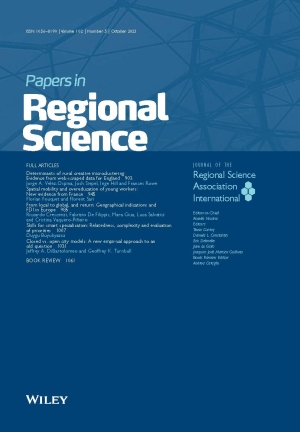


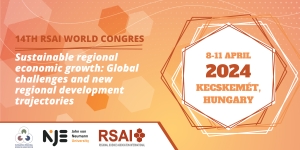
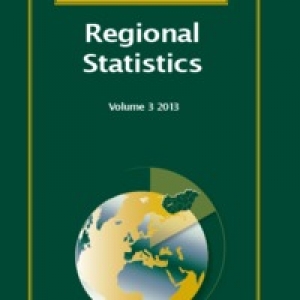
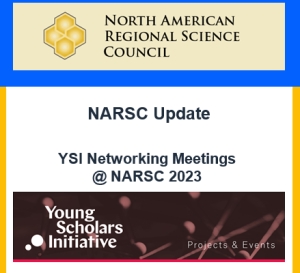


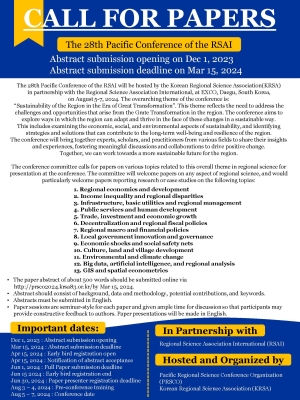
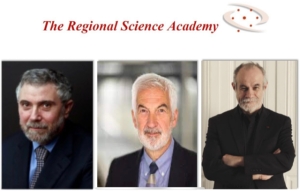
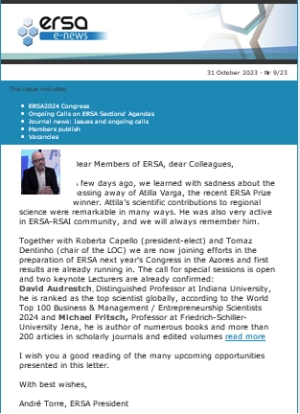

 Dear Members of ERSA, dear Colleagues,
Dear Members of ERSA, dear Colleagues,














